Artículo
Obesity alters the uterine environment before pregnancy
Bazzano, María Victoria ; Sarrible, Gisela Belén; Martinez, Nora; Berón de Astrada, Martín
; Sarrible, Gisela Belén; Martinez, Nora; Berón de Astrada, Martín ; Elia, Evelin Mariel
; Elia, Evelin Mariel
 ; Sarrible, Gisela Belén; Martinez, Nora; Berón de Astrada, Martín
; Sarrible, Gisela Belén; Martinez, Nora; Berón de Astrada, Martín ; Elia, Evelin Mariel
; Elia, Evelin Mariel
Fecha de publicación:
12/2018
Editorial:
Elsevier Science Inc
Revista:
Journal Of Nutritional Biochemistry
ISSN:
0955-2863
Idioma:
Inglés
Tipo de recurso:
Artículo publicado
Clasificación temática:
Resumen
Obesity is a metabolic disorder that predisposes to numerous diseases and has become a major global public health concern. Cafeteria diet (CAF) is the animal model used for the study of obesity that more closely reflects Western diet habits. Previously, we described that CAF administration for 60 days induces obesity in female rats and their fetuses develop macrosomia. Given that, in our model, rats are not genetically modified and that obese mothers were fed standard chow during pregnancy, the aim of the current study was to test the hypothesis that obesity alters the intrauterine environment prior to pregnancy, and this may explain the exacerbated fetal weight gain. We found that uteri from obese rats during the estrous phase developed insulin resistance through mechanisms that involve the induction of uterine hypoxia and the down-regulation of the insulin receptor gene. Moreover, uterine cell proliferation was induced by obesity concomitantly with the reduction in the uterine contractile response to a β2 AR agonist, salbutamol, and this may be consequence of the down-regulation in the uterine β2 AR expression. We conclude that CAF-induced obesity alters the uterine environment in rats during the estrous phase and may cause the fetal macrosomia previously described by us in obese animals. The lower sensitivity of the uterus to a relaxation stimulus (salbutamol) is not a minor fact given that for implantation to occur the uterus must be relaxed for embryo nidation. Thus, the alteration in the uterine quiescence may impair implantation and, consequently, the foregoing pregnancy.
Palabras clave:
ADRENERGIC RECEPTOR
,
GLUCOSE
,
INSULIN
,
OBESITY
,
UTERINE CONTRACTILE ACTIVITY
,
UTERUS
Archivos asociados
Licencia
Identificadores
Colecciones
Articulos(IFIBIO HOUSSAY)
Articulos de INSTITUTO DE FISIOLOGIA Y BIOFISICA BERNARDO HOUSSAY
Articulos de INSTITUTO DE FISIOLOGIA Y BIOFISICA BERNARDO HOUSSAY
Articulos(IFIBYNE)
Articulos de INST.DE FISIOL., BIOL.MOLECULAR Y NEUROCIENCIAS
Articulos de INST.DE FISIOL., BIOL.MOLECULAR Y NEUROCIENCIAS
Citación
Bazzano, María Victoria; Sarrible, Gisela Belén; Martinez, Nora; Berón de Astrada, Martín; Elia, Evelin Mariel; Obesity alters the uterine environment before pregnancy; Elsevier Science Inc; Journal Of Nutritional Biochemistry; 62; 12-2018; 181-191
Compartir
Altmétricas



